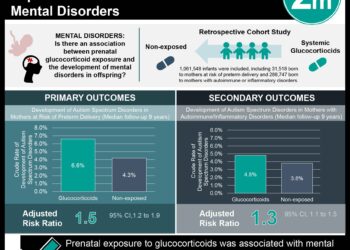AAP issues update on iodine deficiency and associated pollutants
Image: PD
1. Iodine deficiency is common in the United States, and can lead to impairment in neurological development in the fetal and childhood periods.
2. The American Academy of Pediatrics (AAP) recommends that pregnant and lactating women take supplements with iodide, use iodized table salt for cooking, and avoid environmental pollutants that can interfere with iodine uptake.
Study Rundown: Adequate intake of iodine is required for the production of thyroid hormone, which is subsequently critical in fetal and childhood neurological development. This AAP policy statement provides a national update on information regarding iodine deficiency and environmental pollutants that can competitively interfere with the body’s ability to take up and utilize iodine. National guidelines suggest pregnant and lactating women have 290 μg iodide daily, which equates to 150 μg iodide supplementation alongside dietary intake. This update reports that only 15-20% of prenatal supplements have any iodide, and even so, those supplements oftentimes include less than the suggested dosage. Alongside iodide supplementation, pregnant and lactating mothers are urged to use iodized table salt for cooking. Environmental pollutants, such as nitrates (in contaminated water sources) and thiocyanate (in cigarette smoke) should be avoided. On a policy level, advocacy efforts are suggested to target proper labeling of vitamin supplements by the Food and Drug Administration, as well as Environmental Protection Agency examination of perchlorate, a substance which also interferes with iodine transport and may be a substantial water pollutant. Iodine deficiency in pregnant and lactating mothers is both common and preventable in the United States; this policy statement provides guidelines towards that goal.
Click to read the study, published today in Pediatrics
Relevant Reading: Update of Newborn Screening and Therapy for Congenital Hypothyroidism
More from this author: Duration of post-concussive symptoms identified in pediatric patients, AAP issues new guidelines for freestanding urgent care clinics, Home oxygen therapy for mild bronchiolitis explored, QI methods improve adherence to PALS sepsis guidelines, Obesogenic infant feeding behaviors prevalent in 2-month-old infants
©2012-2014 2minutemedicine.com. All rights reserved. No works may be reproduced without expressed written consent from 2minutemedicine.com. Disclaimer: We present factual information directly from peer reviewed medical journals. No post should be construed as medical advice and is not intended as such by the authors, editors, staff or by 2minutemedicine.com. PLEASE SEE A HEALTHCARE PROVIDER IN YOUR AREA IF YOU SEEK MEDICAL ADVICE OF ANY SORT.







